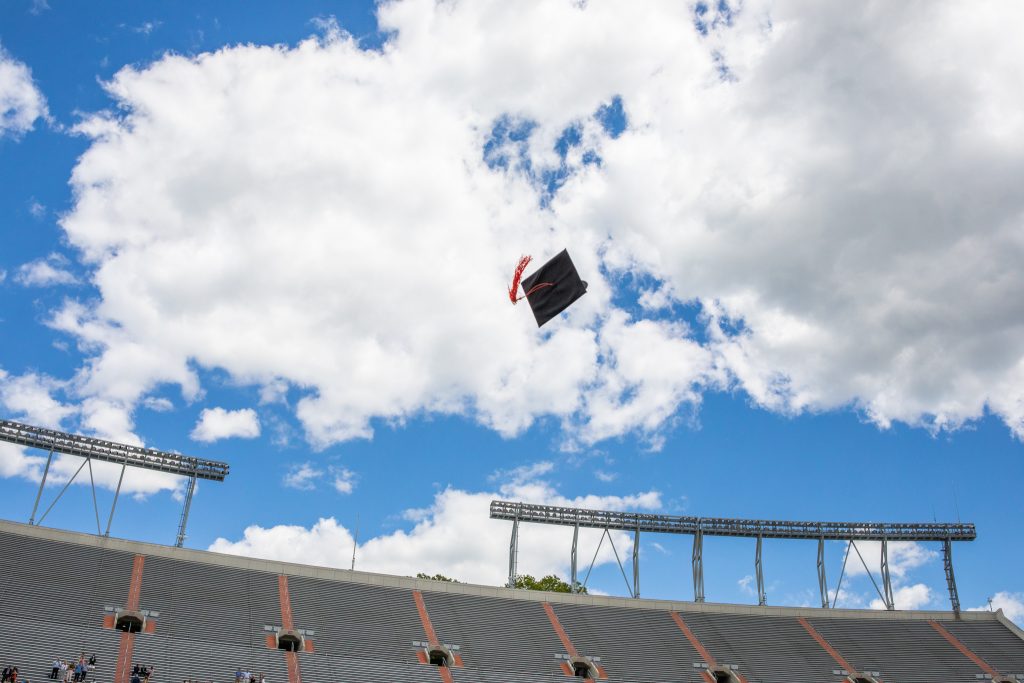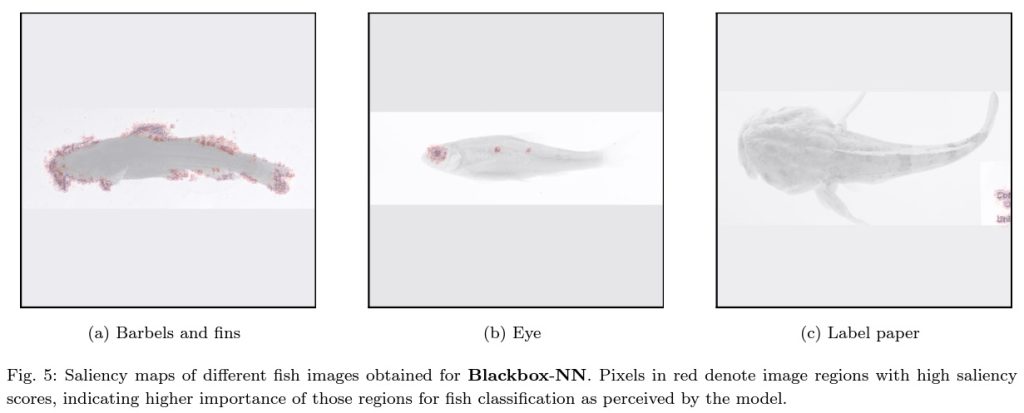Congratulations to Sanghani Center’s 2023 Spring Graduates

Virginia Tech’s 2023 Commencement ceremonies are underway culminating with the university commencement in Blacksburg on Friday, May 12, and commencement in the Washington D.C. area on Sunday, May 14.
“Once again we have come to that bittersweet time when we say farewell to our graduating students at the Sanghani Center and wish them continued success as they take the next step in meeting their long-term goals,” said Naren Ramakrishnan, the Thomas L. Phillips Professor of Engineering in the Department of Computer Science at Virginia Tech and director of the Sanghani Center for Artificial Intelligence and Data Analytics. “We take pride in their hard work and accomplishments and in knowing that they are well prepared to meet real-world challenges.”
The following Sanghani Center students are among the 284 Ph.D. and 1,205 master’s students receiving degrees this Spring.
Ph.D. Graduates
Badour AlBahar, co-advised by Jia-Bin Huang and Lynn Abbott, has earned Ph.D. in electrical and computer engineering. Her research interests lie in computer vision and computer graphics and more specifically, image synthesis. The title of her dissertation is “Controllable Visual Synthesis.” AlBahar is joining Kuwait University in Kuwait City, Kuwait, as an assistant professor.
Jonathan Baker, advised by Mark Embree, has earned a Ph.D. in math. His research interests lie in spectral theory in linear dynamics and control, passive source localization, and machine learning. The title of his dissertation is “Vibrations of mechanical structures: source localization and nonlinear eigenvalue problems for mode calculation.” Baker also received the graduate certificate in Urban Computing.
Jie Bu, advised by Anuj Karpatne, has earned a Ph.D. in computer science. His research interest lies in machine learning, particularly in science-guided machine learning, representation learning, and network pruning. The title of his dissertation is “Achieving More with Less: Learning Generalizable Neural Networks With Less Labeled Data and Computational Overheads.” Bu is joining Apple in Cupertino, California, as a machine learning engineer.
Nurendra Choudhary, advised by Chandan Reddy, has earned a Ph.D. in computer science. His research focus is learning representations for knowledge graphs and natural language by utilizing auxiliary information such as relational structures. The title of his dissertation is “Multimodal Representation Learning for Textual Reasoning over Knowledge Graphs”. Choudhary is joining Amazon in Palo Alto, California, as an applied scientist II.
Mohannad Elhamod, advised by Anuj Karpatne, has earned a Ph.D. in computer science. His research interest is in machine learning in general and, more specifically, in knowledge-guided machine learning. The title of his dissertation is “Understanding The Effects of Incorporating Scientific Knowledge on Neural Network Outputs and Loss Landscapes.” He also received a Graduate Student of the Year Award from the Virginia Tech Graduate School and was one of three speakers at the Graduate School commencement ceremony. Elhamod is joining Questrom School of Business at Boston University in Boston, Massachusetts, as a clinical assistant professor.
Melissa Tilashalski, co-advised by Leanna House and Kimberly Ellis, has earned a Ph.D. in industrial systems engineering. Her research focus is urban computing. The title of her dissertation is “Influence of Customer Locations on Heuristics and Solutions for the Vehicle Routing Problem.” Tilashalski is joining Johns Hopkins University in Baltimore, Maryland, as a lecturer.
Master’s Degree Graduates
Hirva Bhagat, co-advised by Lynn Abbott and Anuj Karpatne, has earned a master’s degree in computer science. Her research focus is on improving driver gaze estimation for driver safety applications. The title of her thesis is “Harnessing the Power of Self-Training for Gaze Point Estimation in Dual Camera Transportation Datasets.” Bhagat will be joining Goldman Sachs in Dallas, Texas, as an analyst in the company’s Risk Engineering Division.
Elizabeth Christman, advised by Chris North, has earned a master’s degree in computer science. Her research interests lie in data analytics and finding ways to visualize and explore big data. The title of her master’s thesis is “2D Jupyter: Design and Evaluation of 2D Computational Notebooks.” Christman is joining Leidos in Bethesda, Maryland, as a software engineer.
Rebecca DeSipio, advised by Lynn Abbott, has earned a master’s degree in electrical and computer engineering. Her research focuses on machine learning and deep learning methods for image classification. The title of her thesis is “Parkinson’s Disease Automated Hand Tremor Analysis from Spiral Images.” She will be joining GA-CCRi in Charlottesville, Virginia, as a data scientist.
Yogesh Deshpande advised by Lynn Abbott, has earned a master’s degree in electrical and computer engineering. His research is focused on exploring and implementing non-invasive techniques to retrieve human body parameters specifically on the usage of computer vision and deep learning methods to address the scope of human authentication based on iPPG signals. The title of his master’s thesis is “Camera-based Recovery of Cardiovascular Signals from Unconstrained Face Videos Using an Attention Network.”
Dhanush Dinesh, advised by Edward Fox, has earned a master’s of engineering degree in computer engineering. His research focus is on developing infrastructure on the cloud to support the processing of large datasets. The title of his thesis is “Utilizing Docker and Kafka for Highly Scalable Bulk Processing of Electronic Thesis and Dissertation (ETDs).” Dhanush has joined Citibank in Irving, Texas, as a senior DevOps engineer.
Hulya Dogan, advised by Ismini Lourentzou, has earned a master’s degree in computer science. Her research interests are social media analysis, machine learning, and natural language processing. The title of her thesis is “Narrative Characteristics in Refugee Discourse: An Analysis of American Public Opinion on Afghan Refugee Crisis After the Taliban Takeover.” Dogan is joining Moog Inc. in Blacksburg, Virginia, as a data analyst and will continue her Fellowship with the CDC in Atlanta in the division of Health Informatics.
Naveen Gupta, advised by Anuj Karpatne, has earned a master’s degree in computer science. His research interest lies in the physics guided machine learning field. The title of his thesis is “Solving Forward and Inverse Problems for Seismic Imaging using Invertible Neural Networks.” Gupta is joining Hughes Communication in Germantown, Maryland, as an MTS 3 – software engineer.
Sahil Hamal is advised by Chris North, has earned a master’s degree in computer science. His research focus is visual analytics and explainable artificial intelligence. The title of his master’s thesis is “Interpreting Dimensions Reductions through Gradient Visualization.” Hamal also received the Paul E. Torgersen Research Excellence Award.
Meghana Holla, advised by Ismini Lourentzou, has earned a master’s degree in computer science. Her research focuses on machine learning and deep learning applied to natural language processing and multimodal problems at the intersection of language and vision. The title of her thesis is “Commonsense for Zero-Shot Natural Language Video Localization.” Holla also received the Paul E. Torgersen Research Excellence Award. She is joining Bloomberg LP in New York City as a machine learning engineer.
Sanjula Karanam, advised by Danfeng (Daphne) Yao, has earned a master’s degree in computer engineering. Her research focuses on detecting ransomware and benign files on a Windows machine using their behavioral aspects, more specifically dynamic function calls made by a file during execution. The title of her thesis is “Ransomware Detection Using Windows API Calls and Machine Learning.”
Gaurang Karwande, advised by Ismini Lourentzou, has earned a master’s degree in electrical and computer engineering. His research focus is in the field of artificial intelligence and its applications in healthcare, more specifically medical imaging and precision medicine. The title of his master’s thesis is “Geometric Deep Learning for Healthcare Applications.” Karwande is joining VideaHealth, Inc. in Boston, Massachusetts, as a machine learning engineer.
Fulan Li, advised by Lynn Abbott, has earned a master’s degree in electrical and computer engineering. His research focuses on extracting PPG signals from human face video using machine learning models. The title of his master’s thesis is “A Temporal Encoder-Decoder Approach to Extracting Blood Volume Pulse Signal Morphology from Face Videos.”
Xiaochu Li, advised by Lifu Huang, has earned a master’s degree in computer science. His research focus is deep learning-based natural language processing and information extraction, especially in entity linking and event extraction in the biomedical domain. The title of his thesis is “Joint Biomedical Event Extraction and Entity Linking via Collaborative Training.”
Javaid Akbar Manzoor, advised by Edward Fox, has earned a master’s degree in computer science. His research focus is on exploring how to use deep learning to segment long scientific documents into chapters. The title of his thesis is “Segmenting Electronic Theses and Dissertations By Chapters.” Manzoor has joined Lightcast in Boston, Massachusetts, as a data scientist.
Avi Seth, advised by Ismini Lourentzou, has earned a master’s degree in computer science. His research is focused on active learning and generative models. The title of his thesis is “Data Sharing and Retrieval of similar Manufacturing Processes.”
Aditya Shah, advised by Edward Fox, has earned a master’s degree in computer science. His research focus is on using Large Language Models (LLMs) for different downstream applications. The title of his master’s thesis is “Leveraging Transformer Models and Elasticsearch to Help Prevent and Manage Diabetes through EFT Cues.” Shah is joining Capital One Headquarters in McLean, Virginia, as a senior data scientist.
Rutuja Taware, advised by Naren Ramakrishnan, has earned a master’s degree in computer science. Her research is focused on analyzing the behavior of transformers when they deal with math problems, specifically in a few-shot setting. The title of her thesis is “A Study of Pretraining Bias and Frequencies in Language Models.”


